Kia Stonic VS Peugeot Partner – Specs, Efficiency & Price Comparison
Which model is the better choice – the Kia Stonic or the Peugeot Partner? We compare performance (100 HP vs 136 HP), boot capacity (352 L vs 1800 L), efficiency (5.50 L vs 17.40 kWh5.20 L), and of course, the price (19300 £ vs 20500 £).
Find out now which car fits your needs better!
The Kia Stonic (SUV) is powered by a Petrol or Petrol MHEV engine and comes with a Manuel or Automatic transmission. In comparison, the Peugeot Partner (Cargo Van) features a Electric, Diesel or Petrol engine and a Automatic or Manuel gearbox.
When it comes to boot capacity, the Kia Stonic offers 352 L, while the Peugeot Partner provides 1800 L – depending on what matters most to you. If you’re looking for more power, you’ll need to decide whether the 100 HP of the Kia Stonic or the 136 HP of the Peugeot Partner suits your needs better.
There are also differences in efficiency: 5.50 L vs 17.40 kWh5.20 L. In terms of price, the Kia Stonic starts at 19300 £, while the Peugeot Partner is available from 20500 £.
Compare all the key specs now and find out which model fits your lifestyle best!
Kia Stonic
The Kia Stonic is a compact crossover that seamlessly blends bold design with practical functionality. Its distinctive, eye-catching exterior is complemented by a well-crafted interior offering a comfortable ride and intuitive technology for today's drivers. The Stonic is perfect for urban environments, providing agility and efficiency without compromising on style or performance.
details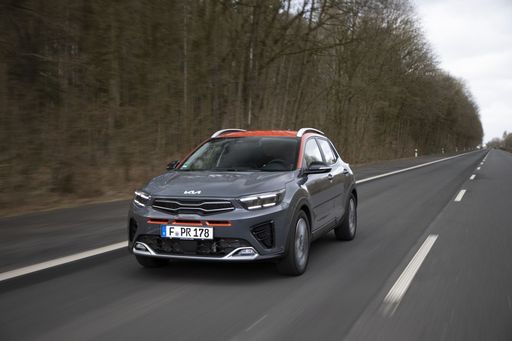 @ press.kia.com
@ press.kia.com
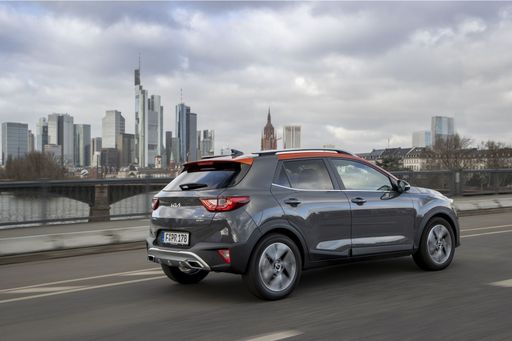 @ press.kia.com
@ press.kia.com
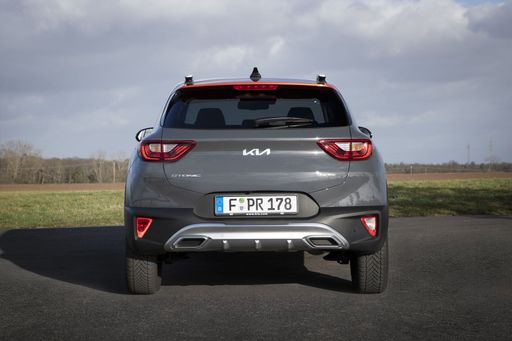 @ press.kia.com
@ press.kia.com
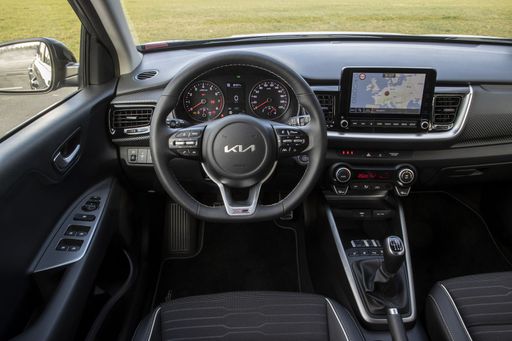 @ press.kia.com
@ press.kia.com
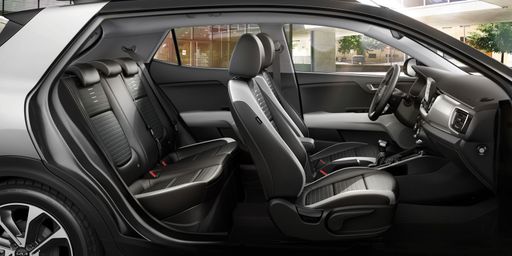 @ press.kia.com
@ press.kia.com
Peugeot Partner
The Peugeot Partner is a versatile and practical vehicle, ideal for both urban and rural settings. Its spacious interior and adaptable seating make it a popular choice for families and businesses alike. With a focus on reliability and efficiency, the Partner is well-suited to meet the demands of everyday transport.
details

|
|
|
|
|
Costs and Consumption |
|
|---|---|
|
Price
19300 - 25400 £
|
Price
20500 - 33800 £
|
|
Consumption L/100km
5.5 - 5.8 L
|
Consumption L/100km
5.2 - 6.3 L
|
|
Consumption kWh/100km
-
|
Consumption kWh/100km
17.40 kWh
|
|
Electric Range
-
|
Electric Range
354 km
|
|
Battery Capacity
-
|
Battery Capacity
-
|
|
co2
125 - 132 g/km
|
co2
0 - 143 g/km
|
|
Fuel tank capacity
45 L
|
Fuel tank capacity
53 - 61 L
|
Dimensions and Body |
|
|---|---|
|
Body Type
SUV
|
Body Type
Cargo Van
|
|
Seats
5
|
Seats
2 - 5
|
|
Doors
5
|
Doors
4 - 5
|
|
Curb weight
1155 - 1260 kg
|
Curb weight
1329 - 1813 kg
|
|
Trunk capacity
352 L
|
Trunk capacity
1800 L
|
|
Length
4140 mm
|
Length
4401 - 4751 mm
|
|
Width
1760 mm
|
Width
1848 mm
|
|
Height
1505 mm
|
Height
1796 - 1812 mm
|
|
Payload
445 - 455 kg
|
Payload
611 - 991 kg
|
Engine and Performance |
|
|---|---|
|
Engine Type
Petrol, Petrol MHEV
|
Engine Type
Electric, Diesel, Petrol
|
|
Transmission
Manuel, Automatic
|
Transmission
Automatic, Manuel
|
|
Transmission Detail
Manual Gearbox, Dual-Clutch Automatic
|
Transmission Detail
Reduction Gearbox, Manual Gearbox, Automatic Gearbox
|
|
Drive Type
Front-Wheel Drive
|
Drive Type
Front-Wheel Drive
|
|
Power HP
79 - 100 HP
|
Power HP
102 - 136 HP
|
|
Acceleration 0-100km/h
11.3 - 14.2 s
|
Acceleration 0-100km/h
11.2 - 14.8 s
|
|
Max Speed
158 - 179 km/h
|
Max Speed
135 - 184 km/h
|
|
Torque
113 - 200 Nm
|
Torque
205 - 300 Nm
|
|
Number of Cylinders
3 - 4
|
Number of Cylinders
3 - 4
|
|
Power kW
58 - 74 kW
|
Power kW
75 - 100 kW
|
|
Engine capacity
998 - 1197 cm3
|
Engine capacity
1199 - 1499 cm3
|
General |
|
|---|---|
|
Model Year
2024 - 2025
|
Model Year
2024
|
|
CO2 Efficiency Class
D
|
CO2 Efficiency Class
A, E
|
|
Brand
Kia
|
Brand
Peugeot
|
Kia Stonic
A Versatile Compact SUV: Introducing the Kia Stonic
The Kia Stonic stands out in the ever-crowded market of compact SUVs, offering a blend of practicality and style underpinned by advanced technology. With its robust build and dynamic aesthetics, the Stonic is designed to appeal to those seeking versatility without compromising on performance and comfort. Let's delve into the technical details and innovations that make the Kia Stonic a compelling choice.
Powertrain Options: From Traditional to Mild-Hybrid
The Kia Stonic features a range of engine choices to cater to diverse consumer needs. The traditional petrol engines are available alongside modern mild-hybrid variants, offering both manual and automatic transmission choices. This flexibility is further bolstered by its front-wheel drive system, delivering a smooth and controlled driving experience. The power output ranges from 79 to 100 PS, with fuel efficiency figures varying between 5.5 to 5.8 litres per 100 km, making it a cost-effective option for urban and suburban driving.
Performance Specs: Balancing Power and Efficiency
The Stonic's performance is defined by its agile handling and responsive power delivery. Its acceleration can take you from 0 to 100 km/h in approximately 11.3 to 14.2 seconds, with a top speed ranging between 158 and 179 km/h. The vehicle's torque is rated between 113 to 200 Nm, delivered effectively across its 3 to 4 cylinder configurations. The Stonic shines with its balance of performance and efficiency, appealing to eco-conscious drivers with its CO2 emissions rated between 125 to 132 g/km.
Innovative Design: Exterior and Interior
Measuring 4140 mm in length, 1760 mm in width, and 1505 mm in height, the Stonic provides a compact yet spacious interior. The model accommodates five passengers comfortably, with ample cargo space of 352 litres, ensuring practicality for everyday use. The exterior design reflects Kia's commitment to a sporty and sleek aesthetic, while the interior is equipped with user-friendly technology aimed at enhancing driver convenience and comfort.
Price and Value: An Attractive Offering
The Kia Stonic is priced between €22,490 and €29,680, depending on the chosen model and specifications. This positions it competitively within the compact SUV segment, offering high value through its quality build and suite of standard features. Monthly costs are manageable, ranging from €826 to €915, with a cost per kilometre between 33 to 36.6 cents, making the Stonic an economical choice for sustained ownership.
Conclusion: A Smart Choice for the Modern Driver
With its range of engine options, innovative design, and practical performance specifications, the Kia Stonic is well-suited for the modern driver seeking an efficient, stylish, and versatile vehicle. Its competitive pricing and exemplary fuel economy further contribute to its appeal, marking it as a standout choice in the compact SUV market.
Peugeot Partner
Exploring the Peugeot Partner: A Blend of Versatility and Innovation
The Peugeot Partner has long been a staple in the world of light commercial vehicles, offering practicality and reliability. However, with the latest iterations, Peugeot has taken a bold step by integrating advanced technology and modern design to create a vehicle that's not just functional, but also efficient and environmentally friendly. Let's dive into the technical details and innovations that make the latest Peugeot Partner a standout choice in its class.
Efficient Powertrains: Diesel, Petrol, and Electric Choices
The 2024 Peugeot Partner provides a wide range of powertrains to suit different needs and preferences. Whether you're looking for the tried-and-tested efficiency of a diesel engine, the simplicity of petrol, or the future-ready appeal of electric, the Partner offers them all. With power outputs ranging from 102 to 136 PS and options for automatic and manual transmissions, it caters to those who desire flexibility in vehicle performance.
Embracing Electric: The E-Partner Revolution
One of the most notable features of the latest Peugeot Partner is the introduction of the e-Partner, an all-electric variant. This model comes equipped with a 50 kWh battery, providing a significant range of up to 354 km on a single charge, making it ideal for urban deliveries or longer commutes with no emissions. Its front-wheel-drive layout and electric motor deliver 136 PS, ensuring a lively yet smooth driving experience.
Room for More: Versatility and Cargo Space
Peugeot understands the importance of adaptability in commercial vehicles. The Partner offers up to 1,800 litres of cargo space, or the capacity to carry payloads ranging from 611 to 991 kg. Additionally, the choice of 4 to 5 doors and seating configurations from 2 to 5 seats ensures that the Partner can be customised to meet the specific needs of various business requirements.
Compact Yet Capable: Dimensions and Design
The Peugeot Partner showcases a clever balance of compact exterior dimensions and a spacious interior. With lengths between 4,401 mm and 4,751 mm, and a width of 1,848 mm, it delivers easy manoeuvrability in urban environments without compromising on cargo capacity. The height ranges from 1,796 mm to 1,812 mm, ensuring stability and on-road presence.
An Eye on Sustainability: CO2 Emissions and Efficiency
Peugeot's commitment to sustainability is evident in the Partner's diverse powertrain options and their associated CO2 emissions, which range from zero for the electric variant to a maximum of 143 g/km for certain internal combustion engine models. This variety allows businesses to choose based on their environmental goals as well as operational needs.
A Multi-Talented Performer: Performance and Practicality
With acceleration figures from 0-100 km/h in just 11.2 seconds for some models and a top speed of up to 184 km/h, the Partner is not just about practicality; it's also about performance. The available torque between 205 and 300 Nm contributes to confident driving dynamics whether navigating urban settings or cruising on the motorway.
Conclusion: The Partner of the Future
The Peugeot Partner continues to be a frontrunner in the small van segment, thanks to its innovative approach to design, fuel efficiency, and technological integration. By providing a range of powertrain options and configurations, the Partner meets the diverse needs of today's businesses while keeping an eye firmly on the future. Whether opting for the environmentally friendly e-Partner or the robust diesel variant, Peugeot has crafted a vehicle that truly earns the name "Partner".
The prices and data displayed are estimates based on German list prices and may vary by country. This information is not legally binding.
